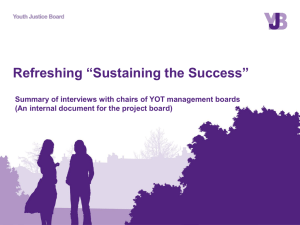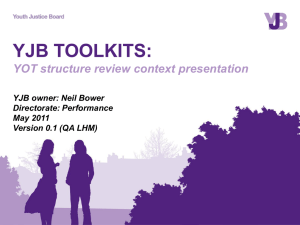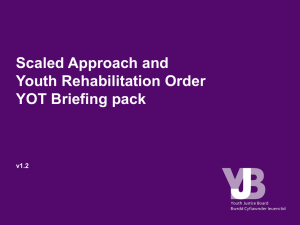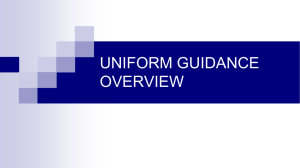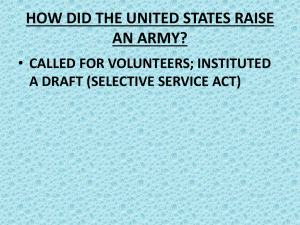Appropriate adult scheme models: December 2014
advertisement
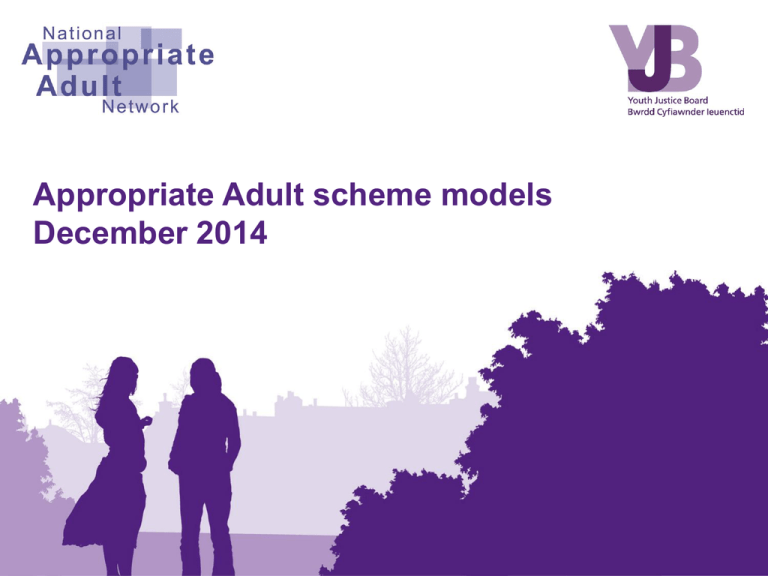
Appropriate Adult scheme models December 2014 Contents • • • • • • Introduction to Appropriate Adults Appropriate Adult scheme models What models are available? Models 1- 5 Summary of models Further information Introduction to Appropriate Adults • Each Youth Offending Team (YOT) has a duty to provide an appropriate adult scheme for children and young people detained and/or interviewed in their area, irrespective of their home area. • If a parent, guardian or carer is unable, unwilling or unsuitable to act as Appropriate Adult, the Custody Sergeant will contact the Appropriate Adult scheme provided by the YOT. • Appropriate adult provision should be an integral part of a YOT’s bail and remand management strategy Appropriate Adult scheme models • Youth Offending Teams meet their statutory obligation to secure the provision of Appropriate Adults using a variety of models. • The Youth Justice Board and National Appropriate Adult Network have created this resource to support YOTs in ensuring effective Appropriate Adults in their area, whether provided directly or commissioned. • The resource outlines the main models currently in use, factors for consideration and an example of where it has been implemented. What models are available? Youth Offending Team Commissioned MODEL 1: Non-profit paid staff MODEL 2: Non-profit volunteers In house MODEL 3: Private sector MODEL 4: YOT volunteers MODEL 5: YOT paid staff Please note: Model numbers assigned do not imply preference by YJB or NAAN Model 1: Commissioned - non-profit (paid staff) Key Elements: Factors for consideration: • YOT commissions non-profit (e.g. charity or public sector) to co-ordinate and deliver • Often a local AA or children's’ non-profit • Scheme designed collaboratively and the non-profit reports management information • The non-profit employs a scheme coordinator plus either dedicated staff, sessional staff, or rotas existing staff • Police contact non-profit directly for AAs • Usually a fixed cost which does not rise or fall in-year dependent on call out volume • High quality, timely information sharing between YOT and provider before and after detention is critical • Non-profits may have additional services to which they can refer a child they support in police custody • AAs are under employment obligations, are likely to fulfil role regularly, be specialised, and have relatively low turnover, reducing spending on initial training. Example: Lancashire, Bury, Bolton and Wigan (Child Action North West) Model 2: Commissioned - non-profit (volunteers) Key Elements: Factors for consideration: • YOT commissions non-profit (e.g. charity or public sector) to co-ordinate and deliver • Often a local AA or children's’ non-profit • Scheme designed collaboratively and the non-profit reports management information • The non-profit employs a scheme coordinator who recruits, trains and supports volunteers and acts as AA if required • Police contact non-profit directly for AAs • Usually a fixed cost which does not rise or fall in-year dependent on call out volume • High quality information sharing is required before and after call out Example: Kent (Young Lives Foundation) • Additional services for children • Volunteers’ passion /commitment; call out costs are expenses only • Community involvement in justice • Volunteer turnover must be managed and may increase initial training costs; need right number for regular utilisation plus effective support Model 3: Commissioned - private sector Key Elements : Factors for consideration: • YOT commissions a private sector provider to co-ordinate and deliver scheme • Costs fall directly if call outs reduce (e.g. first time entrants) but increase directly if they rise (e.g. extension to 17 year olds) • Costs are lower for simple, short call outs but higher for more complex, longer attendances • Level of local knowledge (e.g. for referrals to local services) • Additional services may be available at additional cost • One main provider in the market • Scheme design as specified in contract by commissioner • Usually a specialist organisation • Provider recruits AAs, provides YOT with management information as specified • AAs are usually casual/sessional staff paid on an hourly basis • YOT usually charged per hour Example: Enfield (The Appropriate Adult Service Limited) Model 4: YOT - co-ordinated volunteers Key Elements: Factors for consideration: • YOT establish and run the scheme directly • YOT employs an AA Co-ordinator to recruit, train and support AAs (depending on scheme size they may have other duties) • Volunteer AAs are recruited by the YOT, often as part of a wider volunteer scheme • Training may consist of core modules for all volunteers, plus specialist AA training • Police contact YOT directly for AAs •Co-ordinator (or other staff) provide cover if no volunteers are available • Information sharing is within the single organisation • AA service is physically embedded within core YOT team • Training volunteers in multiple roles can increase utilisation and may improve retention • Community involvement in YOT • Time required for recruitment, training and support is significant; requires increase in staff hours Example: Ceredigion (Ceredigion YOT) Model 5: YOT – paid staff Key Elements: Factors for consideration: • YOT establishes, co-ordinates and delivers the AA scheme directly • AAs have full access to YOT information systems • YOT staff may be able to provide additional services or assessments • YOT staff must be trained and developed in the AA role • YOT staff may know, and be known to, some children, affecting levels of trust • Call outs occur at any time and may last from minutes to several days, affecting work schedules • AA duty may be assigned to a single member of YOT staff, the lead worker for a known child, a YOT social worker (if available), rotated between staff, or sessional staff • Police contact YOT directly for AAs Example: Warwickshire (Warwickshire YOT) Out of Hours Provision of AAs • The duty to ensure provision applies equally during the day and night. • However, enabling an interview of a child out of hours is a matter of the individual child’s best interests taking into account; their usual sleep/wake cycle, their last period of rest, the PACE requirement for 8 hours rest in any 24 hours, the need to avoid unnecessary delay to their release, the likelihood of overnight detention and the seriousness of the offence. • YOTs currently ensure out of hours provision through (a) the above models and/or (b) the Emergency Duty Team (EDT). For example, contracted provision could run 8am to 12am and EDT 12am to 8am. • The YOT should ensure that all out of hours AAs have the necessary training, resources, information and on–call support arrangements Conclusion •Each model identified will have various benefits and some may be more suitable dependent on factors including the geographical location of the YOT and the number of call outs for Appropriate Adults in the area • Commissioning decisions are a matter for individual YOTs but should take into account best value, considering statutory responsibilities, outcomes for children and young people and costs •A budget calculator tool has been produced by The National Appropriate Adult Network which will allow YOTs to compare the cost effectiveness of different models. NAAN members have access to the budget calculator and can be accessed via their website. Further information • Youth Justice National Standards https://www.gov.uk/government/publications/national-standards-for-youth-justiceservices •Youth Justice Board- Case Management Guidance: Section 3 https://www.gov.uk/government/publications/manage-bail-and-remand/managebail-and-remands-section-3-case-management-guidance • Home Office guidance for appropriate adults https://www.gov.uk/government/publications/guidance-for-appropriate-adults • National Appropriate Adult Network http://www.appropriateadult.org.uk/


